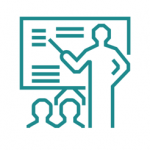Female Mentoring
Why female mentoring? Women still represent a minority in academia and the proportion of women in the areas of business and economics, especially in post-doctoral and professor positions, is still very low. This is not a result of women being less qualified, but has grown historically through traditional female role models and the resulting outdated expectations in society. The conditions of an academic career are also decisive in this regard. An academic career path is still associated with a great deal of uncertainty and often collides, for example, with family planning. In the TRR 266, we want to change this and support our early career female researchers. This will not only smooth the way for women in the TRR 266, but also have a positive impact on the science system as a whole. Studies in fact show that mixed-gender teams are clearly more productive than pure male or female teams.

Our vales in the TRR 266 Female Mentoring Program
Companionship – Support – Promotion
To support you in your professional career
About the program
Female postdocs and doctoral students in the TRR 266 will be matched with experienced female professors, their mentors. The program consists of three main pillars:
Regular 1:1 meetings

The meetings consist of individual companionship and coaching, career orientation, individual career planning, development of individual publication and career strategies, general recommendations and reflection.
Networking

Mentors will introduce the mentee to people from their own professional networks. This helps to build and broaden the mentee‘s network and get in touch with the people from the community.
Meetings & Workshops

An annual general meeting and workshops (e. g. personal and professional development coaching with external coaches and trainers) will help to develop and deepen professional competencies and soft skills as well as foster exchange experiences with other mentees.

Mentee Experiences
“Our meetings were truly valuable for growing professionally and personally.”
“We talked about big topics with always a pragmatic approach, for example it was very useful when we discussed my point of weaknesses and how to tackle them.”
“I think the program is extremely important for juniors who want to stay in academia.”
“To have the possibility to talk to a successful role model who is outside your university network is very valauble because we are confronted with big decisions in the early career and we lack the framework on how to evaluate the possible options.”
Successes
Through our female mentoring program, many of our mentees were able to get assistant professor placements at various international universities, e.g. Erasmus University Rotterdam, Chinese University of Hong Kong, Aalto University, NHH Norwegian School of Economics, SKEMA Business School, Tilburg University, Wharton School of the University of Pennsylvania and University of St. Gallen.